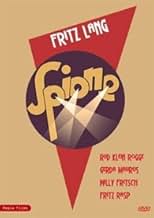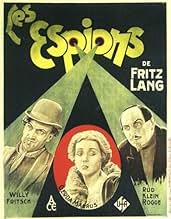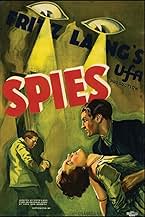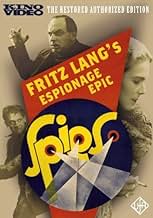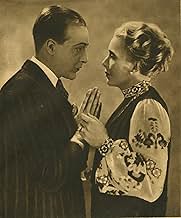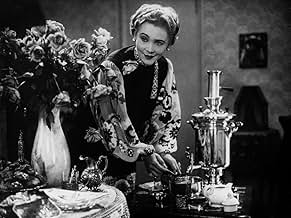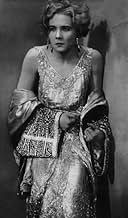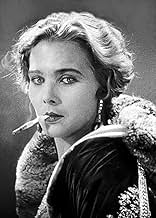VALUTAZIONE IMDb
7,5/10
4209
LA TUA VALUTAZIONE
La mente dietro un'onnipresente operazione di spionaggio viene a conoscenza di una pericolosa storia d'amore tra una donna russa al suo servizio e un affascinante agente dei servizi segreti ... Leggi tuttoLa mente dietro un'onnipresente operazione di spionaggio viene a conoscenza di una pericolosa storia d'amore tra una donna russa al suo servizio e un affascinante agente dei servizi segreti governativi.La mente dietro un'onnipresente operazione di spionaggio viene a conoscenza di una pericolosa storia d'amore tra una donna russa al suo servizio e un affascinante agente dei servizi segreti governativi.
- Regia
- Sceneggiatura
- Star
- Premi
- 1 candidatura in totale
Grete Berger
- Unconfirmed Role
- (non citato nei titoli originali)
Julius Falkenstein
- Hotel Manager
- (non citato nei titoli originali)
Heinrich Gotho
- Burton Jason's Other Assistant
- (non citato nei titoli originali)
Heinrich Gretler
- Spy in the Post Office scene
- (non citato nei titoli originali)
Gustl Gstettenbaur
- Boy Who Helps No. 326
- (non citato nei titoli originali)
Georg John
- Locomotive Engineer
- (non citato nei titoli originali)
Theodor Loos
- Handelsminister
- (non citato nei titoli originali)
Klaus Pohl
- Burton Jason's Assistant
- (non citato nei titoli originali)
Recensioni in evidenza
Spione (Spies) is a Fritz Lang film about spy espionage. The plot is strangely more complicated than more recent spy flicks (which is a good thing). The film focuses on No. 326, a spy that is responsible for investigating leads on a mysterious mastermind that controls a network of spies. The mastermind, known as Haghi, plots to steal an important treaty. It turns out that he leads a double life as the owner of a successful bank (which apparently makes him richer than Henry Ford). Things get complicated when Haghi sends a female spy, Sonya, to prevent No. 326 from interfering. Sonya falls in love with No. 326 while still under the supervision of Haghi, leading to the usual conflicts.
The acting and characterization was wonderful. Haghi is the definition of bad guy: you know he is evil when you see the goatee. Confined to a wheelchair, he is the perfect blend of intelligence and deceptiveness. Agent No. 326 is an interesting character, although he loses some of his features as the film progresses. Sonya is beautiful and acted wonderfully. Among the side characters, I found that Colonel Jellusic and Doctor Masimoto stood out.
Although a little overlong, the film is at no point slow. Mixing fast pacing with well-placed plot twists (which really build up towards the end), anyone with interest in the subject should have no problem enjoying it for the entire running time.
I was not sure what to expect from Spione before watching it, seeing that it is a largely forgotten film. I enjoy Fritz Lang films, and this was no exception. It may not be the caliber of M, but it succeeds anyway. If you do not mind silent films and enjoy the spy/espionage genre (namely, James Bond), then you will enjoy this one.
The acting and characterization was wonderful. Haghi is the definition of bad guy: you know he is evil when you see the goatee. Confined to a wheelchair, he is the perfect blend of intelligence and deceptiveness. Agent No. 326 is an interesting character, although he loses some of his features as the film progresses. Sonya is beautiful and acted wonderfully. Among the side characters, I found that Colonel Jellusic and Doctor Masimoto stood out.
Although a little overlong, the film is at no point slow. Mixing fast pacing with well-placed plot twists (which really build up towards the end), anyone with interest in the subject should have no problem enjoying it for the entire running time.
I was not sure what to expect from Spione before watching it, seeing that it is a largely forgotten film. I enjoy Fritz Lang films, and this was no exception. It may not be the caliber of M, but it succeeds anyway. If you do not mind silent films and enjoy the spy/espionage genre (namely, James Bond), then you will enjoy this one.
One of things that I think attracts young film fans to German cinema from the Weimar period is that it displays a striking stylistic extremism that captivates modern viewers not yet used to silent cinema. This ranges from Murnau's technical effects extravaganzas, to Lubitsch's off-the-wall comedy creations and, of course, Fritz Lang's angular architecture and comic-book sense of adventure.
A mistaken impression with these pictures is that they got to be so stylised because of a higher degree of artistic freedom in the European studios. However UFA studios were just as much about collaboration and commercialism as those in Hollywood. While individual directors did have a lot of control over the look of their pictures, these overt styles owe more to the influence of German theatre, as well as German literature, painting and the opera.
As with any cinema, anywhere, one of the most important collaborators is the screenwriter. No matter how strong or attention-grabbing your visual style is, if you haven't got the story, you haven't got anything. Spione features one of the best efforts from Lang's collaborator and wife Thea von Harbou, and is in many ways a tightened-up reworking of Dr Mabuse. Whereas that earlier picture was full of unnecessarily long title cards, Spione is far more succinct, allowing the audience to fill in the gaps. Importantly it begins with a lengthy piece of pure silent storytelling, which helps to engage us before bombarding us with verbal information. Harbou's characters are also very strong. It's a nice touch to make arch-villain Haghi wheelchair bound – a man who is weak in body but strong in means and influence.
Lang himself was by now a master of his own highly individual technique. Space and set décor should be important to every director, but Lang is probably the only one who tells his stories more through architecture than through actors. With rooms so bizarre and angular they would probably drive most people mad if they had to live or work in them, Lang sets a tone for each location, and thus for each scene. Narrow corridors give a sense of entrapment; open doorways leading onto larger spaces give a sense of uneasiness; crisscrossing diagonals carve up the screen, often drawing our attention to things and people. One thing that especially stands out in Spione is that way Lang often creates compositions that are almost-but-not-quite symmetrical. Just as a great colour director like Vincente Minnelli might throw in a splash of blue to offset (and thus bring to life) a shot full of shades of red, Lang adds for example the nurse standing to one side of an otherwise symmetrical shot of Haghi sat at his desk.
Even Lang's choice of camera position was strictly angular. He is either to one side, detached from the action, or he is right inside it with actors staring straight into the lens. He rarely uses, say, opposing over-the-shoulder shots that many directors would for intimate dialogue scenes, but his methods were nonetheless effective. Spione in fact features one of his most beautifully constructed romantic scenes in the first meeting between Willy Fritsch and Gerda Maurus. Lang begins with the camera to one side, simply filming the meeting as a casual observer. He then begins placing the camera between them, interspersed with close-ups of hands or other objects, making us experience the growing emotional intensity as well as that slight feeling of awkwardness. We then return to a shot to the side of the actors, but closer this time, as they move in for their first kiss. In spite of his reputation Lang could be incredibly tender and sentimental at times.
Exaggerated acting tends to be part and parcel of that over-the-top nature of German silent cinema, and in the case of Lang's features it is often particularly apt given the comic-book style characters and situations. Spione is no exception, but it is nice to see the normally animated Rudolf Klein-Rogge getting to underplay it a little as a cool and collected villain. Lupu Pick also gives a very deep and emotionally complex performance as the Japanese ambassador.
The upshot of this collaboration is an incredibly exciting and satisfying picture, even though it is rarely referenced as one of Fritz Lang's best. If it is remembered at all it is usually for its resemblance to later gadget-based espionage thrillers, as well as containing many of the suspense building techniques later employed by Hitchcock, such as letting the audience in on things the characters do not know. It is, nevertheless, among the most carefully constructed, exciting and purely enjoyable of Lang's silent pictures, and an improvement on the better-known Dr Mabuse.
A mistaken impression with these pictures is that they got to be so stylised because of a higher degree of artistic freedom in the European studios. However UFA studios were just as much about collaboration and commercialism as those in Hollywood. While individual directors did have a lot of control over the look of their pictures, these overt styles owe more to the influence of German theatre, as well as German literature, painting and the opera.
As with any cinema, anywhere, one of the most important collaborators is the screenwriter. No matter how strong or attention-grabbing your visual style is, if you haven't got the story, you haven't got anything. Spione features one of the best efforts from Lang's collaborator and wife Thea von Harbou, and is in many ways a tightened-up reworking of Dr Mabuse. Whereas that earlier picture was full of unnecessarily long title cards, Spione is far more succinct, allowing the audience to fill in the gaps. Importantly it begins with a lengthy piece of pure silent storytelling, which helps to engage us before bombarding us with verbal information. Harbou's characters are also very strong. It's a nice touch to make arch-villain Haghi wheelchair bound – a man who is weak in body but strong in means and influence.
Lang himself was by now a master of his own highly individual technique. Space and set décor should be important to every director, but Lang is probably the only one who tells his stories more through architecture than through actors. With rooms so bizarre and angular they would probably drive most people mad if they had to live or work in them, Lang sets a tone for each location, and thus for each scene. Narrow corridors give a sense of entrapment; open doorways leading onto larger spaces give a sense of uneasiness; crisscrossing diagonals carve up the screen, often drawing our attention to things and people. One thing that especially stands out in Spione is that way Lang often creates compositions that are almost-but-not-quite symmetrical. Just as a great colour director like Vincente Minnelli might throw in a splash of blue to offset (and thus bring to life) a shot full of shades of red, Lang adds for example the nurse standing to one side of an otherwise symmetrical shot of Haghi sat at his desk.
Even Lang's choice of camera position was strictly angular. He is either to one side, detached from the action, or he is right inside it with actors staring straight into the lens. He rarely uses, say, opposing over-the-shoulder shots that many directors would for intimate dialogue scenes, but his methods were nonetheless effective. Spione in fact features one of his most beautifully constructed romantic scenes in the first meeting between Willy Fritsch and Gerda Maurus. Lang begins with the camera to one side, simply filming the meeting as a casual observer. He then begins placing the camera between them, interspersed with close-ups of hands or other objects, making us experience the growing emotional intensity as well as that slight feeling of awkwardness. We then return to a shot to the side of the actors, but closer this time, as they move in for their first kiss. In spite of his reputation Lang could be incredibly tender and sentimental at times.
Exaggerated acting tends to be part and parcel of that over-the-top nature of German silent cinema, and in the case of Lang's features it is often particularly apt given the comic-book style characters and situations. Spione is no exception, but it is nice to see the normally animated Rudolf Klein-Rogge getting to underplay it a little as a cool and collected villain. Lupu Pick also gives a very deep and emotionally complex performance as the Japanese ambassador.
The upshot of this collaboration is an incredibly exciting and satisfying picture, even though it is rarely referenced as one of Fritz Lang's best. If it is remembered at all it is usually for its resemblance to later gadget-based espionage thrillers, as well as containing many of the suspense building techniques later employed by Hitchcock, such as letting the audience in on things the characters do not know. It is, nevertheless, among the most carefully constructed, exciting and purely enjoyable of Lang's silent pictures, and an improvement on the better-known Dr Mabuse.
Okay, the movie doesn't feature the secret agent with the famous number 007. But after I've seen this really entertaining movie , I wondered if Ian Fleming saw this movie before he created his legendary hero. It contains everything we already know from the James Bond movies:
- A strong and handsome hero with a secret identity number (this time 326) - A sinister and evil villain in a wheelchair (without a white cat, but with a striking resemblance to Lenin) - A secret headquarter for the villains - An attractive heroine, who falls immediately in love with the hero - exiting action-sequences and chases (featuring a crashing train and motorcycles) etc., etc. . Willy Fritsch is very good in the role of the hero (even though you wouldn't associate him with this genre when you saw his comedies) and Rudolf Klein Rogge (the mad scientist from Metropolis) is perfectly evil. The movie is fast-paced and very entertaining, despite its length of nearly three hours. Lang shows that he is correctly regarded as one of the best german directors of all time and that he is capable of succeeding in every genre, be it science-fiction, crime or even spy-adventures.
9elag
I saw the restored version which is an hour longer than the print commonly available. Lang did some amazing things with text and graphics. His great reputation for innovation is well deserved.
This film is also very funny at times... as a result of intentional exaggeration for the most part. The level of expressionist abstraction allows one to view the mechanisms of the plot at some distance... the better to enjoy the formal qualities of Lang's vision.
This film is also very funny at times... as a result of intentional exaggeration for the most part. The level of expressionist abstraction allows one to view the mechanisms of the plot at some distance... the better to enjoy the formal qualities of Lang's vision.
Fritz Lang, undeniably one of the greatest and most influential film-makers in all of cinema, is one of my favorites and, from his early work which remains, perhaps, his most important I only had a few of his surviving films still to catch up with. SPIONE was one of them and, now that I've watched it, I can confirm its stature as one of his very best, if relatively little-known.
The film is basically a follow-up to Lang's seminal two-part DR. MABUSE, THE GAMBLER (1922) and, indeed, it's Rudolph Klein-Rogge himself who originated the role of Mabuse who plays the evil crimelord here (called Haghi and who is made-up to resemble Lenin!). SPIONE follows much the same pattern of intrigue, thrills and action; however, the film's narrative structure is not straightforward but rather elliptical and, even though ostensibly dealing with the conflict which may arise were a treaty to fall into the wrong hands, several major plot points are left deliberately obscure (in fact, we never get to know what the treaty actually contains a precursor to Hitchcock's beloved "McGuffin", perhaps or what Haghi's intentions are, once he gets his hands on it!). In this respect, the social conscience so pronounced in the Mabuse diptych coming, as it did, on the heels of Germany's defeat in WWI is largely jettisoned here in favor of romance (between a female spy desired, and being blackmailed, by Haghi and the Secret Service agent who is the mastermind's nemesis), eroticism (the ensnaring of a central political figure by a vamp in Haghi's service) and technical dexterity (ensuring that SPIONE's considerable 2½-hour running-time goes by rapidly and without any longueurs, in my estimation at least, as opposed to the sluggish and rather static Mabuse). It is not inconceivable, therefore, to discern in Lang's fanciful melodrama the germ for all the spy thrillers which followed from Hitchcock to the James Bond extravaganzas and beyond.
As befits a master story-teller like Lang, particularly during this most creative phase of his career, SPIONE is virtually a catalogue of memorable scenes (interestingly enough, the supplementary photo gallery includes shots from sequences that are missing in the main feature!) chief among them a ghostly visitation, a ritual suicide, a train-wreck, a police raid on a bank and a stage performance by a clown; however as opposed to the DVD back-cover, which blatantly spells out its most clever twist in emulation of the film itself, I've refrained from giving too much away about them here
The film is basically a follow-up to Lang's seminal two-part DR. MABUSE, THE GAMBLER (1922) and, indeed, it's Rudolph Klein-Rogge himself who originated the role of Mabuse who plays the evil crimelord here (called Haghi and who is made-up to resemble Lenin!). SPIONE follows much the same pattern of intrigue, thrills and action; however, the film's narrative structure is not straightforward but rather elliptical and, even though ostensibly dealing with the conflict which may arise were a treaty to fall into the wrong hands, several major plot points are left deliberately obscure (in fact, we never get to know what the treaty actually contains a precursor to Hitchcock's beloved "McGuffin", perhaps or what Haghi's intentions are, once he gets his hands on it!). In this respect, the social conscience so pronounced in the Mabuse diptych coming, as it did, on the heels of Germany's defeat in WWI is largely jettisoned here in favor of romance (between a female spy desired, and being blackmailed, by Haghi and the Secret Service agent who is the mastermind's nemesis), eroticism (the ensnaring of a central political figure by a vamp in Haghi's service) and technical dexterity (ensuring that SPIONE's considerable 2½-hour running-time goes by rapidly and without any longueurs, in my estimation at least, as opposed to the sluggish and rather static Mabuse). It is not inconceivable, therefore, to discern in Lang's fanciful melodrama the germ for all the spy thrillers which followed from Hitchcock to the James Bond extravaganzas and beyond.
As befits a master story-teller like Lang, particularly during this most creative phase of his career, SPIONE is virtually a catalogue of memorable scenes (interestingly enough, the supplementary photo gallery includes shots from sequences that are missing in the main feature!) chief among them a ghostly visitation, a ritual suicide, a train-wreck, a police raid on a bank and a stage performance by a clown; however as opposed to the DVD back-cover, which blatantly spells out its most clever twist in emulation of the film itself, I've refrained from giving too much away about them here
Lo sapevi?
- QuizUFA insisted on the film being made inexpensively, as Fritz Lang's previous film Metropolis (1927) had brought the studio to near bankruptcy. Lang therefore chose to do most of the shots in narrow settings with lots of close-ups, as no big sets had to be built up for that way of filming. Fortunately "Spione" became a huge success.
- BlooperWhen Sonya and Franz (the chauffeur) are tied up and trying to escape, the hand cranking the camera is visible.
- ConnessioniEdited into Fritz Lang, le cercle du destin - Les films allemands (2001)
I più visti
Accedi per valutare e creare un elenco di titoli salvati per ottenere consigli personalizzati
- How long is Spies?Powered by Alexa
Dettagli
- Tempo di esecuzione
- 2h 30min(150 min)
- Colore
- Mix di suoni
- Proporzioni
- 1.33 : 1
Contribuisci a questa pagina
Suggerisci una modifica o aggiungi i contenuti mancanti


